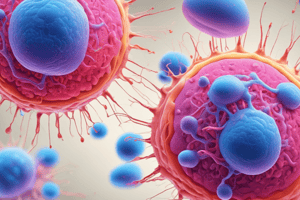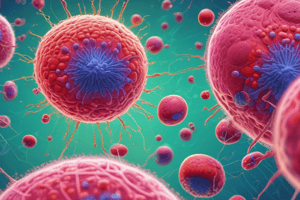Podcast
Questions and Answers
Which of the following organs is responsible for educating T lymphocytes to distinguish between self and non-self?
Which of the following organs is responsible for educating T lymphocytes to distinguish between self and non-self?
- Bone marrow
- Thymus (correct)
- Liver
- Spleen
Where does lymphopoiesis occur in the fetus?
Where does lymphopoiesis occur in the fetus?
- Bone marrow
- Spleen
- Liver (correct)
- Thymus
What is the primary function of secondary lymphoid organs?
What is the primary function of secondary lymphoid organs?
- To educate T lymphocytes
- To generate immune cells
- To store immune cells
- To provide a favorable environment for cell contact and activation (correct)
What is the term for the process of immune cells leaving the blood vessels and migrating throughout the body?
What is the term for the process of immune cells leaving the blood vessels and migrating throughout the body?
Which of the following is NOT a function of lymphocytes?
Which of the following is NOT a function of lymphocytes?
What is the name of the fluid that carries cells and debris through small-vessel lymphatics?
What is the name of the fluid that carries cells and debris through small-vessel lymphatics?
What is the term for the process of immune cells migrating through the body and returning to the blood supply?
What is the term for the process of immune cells migrating through the body and returning to the blood supply?
Which of the following organs is responsible for filtering the blood and removing pathogens?
Which of the following organs is responsible for filtering the blood and removing pathogens?
What is the term for the process of immune cells recognizing and responding to antigens?
What is the term for the process of immune cells recognizing and responding to antigens?
What is the term for the process of immune cells adapting to specific pathogens and remembering them for future responses?
What is the term for the process of immune cells adapting to specific pathogens and remembering them for future responses?
Flashcards are hidden until you start studying
Study Notes
Neutrophils and NETs
- Neutrophils release enzymes to combat microorganisms in extracellular spaces
- The process of creating NETs (Neutrophil Extracellular Traps) is called netosis
Lymphoid Leukocytes and Their Properties
- B cells: adaptive, humoral immunity, antibody-secreting
- T cells: adaptive, cell-mediated immunity, immune response regulation
- NKT cells: adaptive, cell-mediated immunity (glycolipids)
- NK cells: innate, innate response to microbial or viral infection
Eosinophils and Basophils
- Eosinophils: defend against large multicellular parasites
- Basophils and mast cells: produce cytokines, defend against parasites, involved in allergic inflammation
Macrophages and Dendritic Cells
- Macrophages: involved in phagocytosis and intracellular killing of microorganisms
- Macrophages and DCs: contain surface molecules that directionally drive responsiveness and focus adaptive responses
Platelets and Erythrocytes
- Platelets: involved in blood clotting and wound repair, release inflammatory mediators
- Erythrocytes (RBCs): serve as dynamic reservoirs of inflammatory mediators
Lymphoid Cells and Adaptive Immunity
- Lymphoid cells: provide efficient, specific, and long-lasting immunity against microbes and pathogens
- Lymphocytes differentiate into separate lineages, including B and T cells
- B cells: secrete antibodies
- T cells: operate in a supervising role to mediate cellular and humoral immunity
- NK cells: critical in defense against viral agents
Lymphocyte Development and Function
- Lymphocytes express specific receptors for antigens on their cell surfaces
- Primary lymphoid organs: sites where lymphoid cells are generated, including the liver (fetus) and bone marrow (after birth)
- Secondary lymphoid organs: sites where antigen-driven proliferation and maturation of lymphocytes occur
Studying That Suits You
Use AI to generate personalized quizzes and flashcards to suit your learning preferences.




